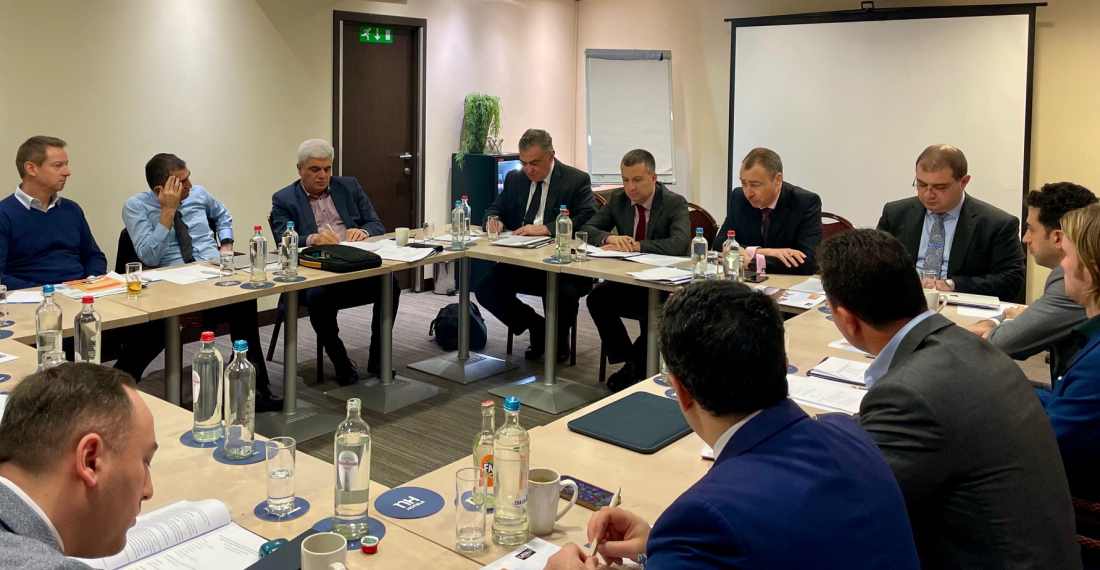Press Statement issued following the meeting of The Joint Armenian-Azerbaijani Liaison Group on Confidence-building measures in support of lasting peace in the South Caucasus (JOLIG) held in Brussels 1-2 February 2023.
The Joint Armenian-Azerbaijani Liaison Group on Confidence-building measures in support of lasting peace in the South Caucasus (JOLIG) met in Brussels on 1 – 2 February 2023. Armenian and Azerbaijani experts that form part of the Group discussed recent developments in the South Caucasus, developments in the process of normalising Armenia-Azerbaijan relations and establishing peace in the region, and how confidence-building measures can help overcome present and future problems and challenges.
On 1 February, the Group had a substantive meeting with the European Union Special Representative for the South Caucasus, Toivo Klaar, who reiterated the continued and ongoing commitment of the European Union in support of peace between Armenia and Azerbaijan. The group asked EUSR Toivo Klaar to convey their appreciation to European Council President Charles Michel for his continuing efforts to mediate between the two sides. The Group expressed its willingness to contribute with tangible actions and initiatives towards on-going European Union peace efforts in the region.
The Group reviewed recent developments in the region. They noted the recent statements by the leaders of Armenia and Azerbaijan committing to a peaceful resolution of the problems between the two countries and to the normalisation of relations. The Group called on all sides to remain focused on this objective, take steps to resolve immediate outstanding issues, taking into account the concerns of both sides, and to avoid any actions that can derail or harm the process. The Group called on all interested parties to maintain constant dialogue and open lines of communications in order to overcome issues that may arise.
The Joint Armenian-Azerbaijani Liaison Group on Confidence-building measures in support of lasting peace in the South Caucasus (JOLIG) discussed the process of building trust and confidence between different stakeholders in the region following their report “30 measures between now and 2030” published in April 2022. Members of the Group emphasised that lack of trust between Armenia and Azerbaijan and between Armenians and Azerbaijanis at all levels continues to be a major obstacle in progress towards a peaceful and lasting solution to the problems of the region. They called on the two sides to engage more resolutely in the process of building trust and confidence. The Group discussed in detail how it could contribute towards this process. The group reiterated its willingness to continue working intensively with the two sides, and with the international community, on this matter.
The following members of the Joint Liaison Group were present for the Brussels meeting: Ahmad Alili (Co-rapporteur); Mehman Aliyev; Stepan Grigoryan; Shahla Ismayil; Gevorg Melikyan; Johny Melikyan; Benyamin Poghosyan (Co-rapporteur) and Ramazan Samadov. Gulmammad Mammadov attended as guest participant. The Joint Armenian-Azerbaijani Liaison Group on Confidence-building measures in support of lasting peace in the South Caucasus (JOLIG) is an independent initiative facilitated by LINKS Europe, and supported by the European Union.
More information about the Joint Liaison Group and its work is available on the website commonspace.eu here. For more information about the Brussels meeting and the work of JOLIG please contact Maximiliaan van Lange (maximiliaan@links-europe.eu).
source: commonspace.eu with The Joint Armenian-Azerbaijani Liaison Group on Confidence-building measures in support of lasting peace in the South Caucasus (JOLIG)
photo: JOLIG







